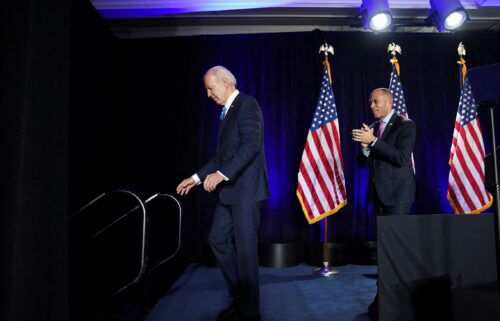Mississippi, Texas and Ohio move to limit abortion as part of coronavirus response

Mississippi, Ohio and Texas are including abortions among nonessential surgical procedures that must be deferred or canceled as coronavirus cases flood the health care system.
State officials say the steps are necessary to preserve protective supplies that are becoming increasingly precious as the pandemic worsens. But abortion-rights groups have decried the actions, saying officials are exploiting a public health crisis to advance a political agenda.
Republican Mississippi Gov. Tate Reeves said during a news conference Tuesday that he would take action if the state’s single clinic was providing elective abortions after the state health department required that non-essential surgery be postponed.
“We’re doing everything in our power and have for many years to make Mississippi the safest place in America for unborn children,” he said. “It is without question that the lone clinic in Jackson does, in fact, operate doing procedures that are elective and not required, and therefore they should be following the guidelines as offered by the state department of health.”
Reeves later said that the order came “not because we’re trying to say anything other than we need to protect” personal protective equipment for those impacted by the virus.
When CNN called Jackson Women’s Health Organization, the last abortion clinic in Mississippi, the person picking up the phone said a spokesperson was not available and declined to comment.
On Monday, Texas Attorney General Ken Paxton confirmed that abortion was included in Republican Texas Gov. Greg Abbott’s order that health care providers “postpone all surgeries and procedures that are not immediately medically necessary” to preserve a patient’s life or condition.
Violating the order, Paxton noted, could result in fines of up to $1,000 or 180 days imprisonment.
Amy Hagstrom Miller, president of Whole Woman’s Health, which runs three clinics in Texas, slammed the order for, in light of state abortion restrictions, “forc(ing) people to delay much needed care and possibly exacerbate their health situations by doing so. Patients cannot wait until this pandemic is over to receive safe abortion care.”
The group canceled appointments yesterday and is “currently exploring all options at this point,” Jessica Shein, the group’s communications director, told CNN Wednesday.
And in Ohio, Deputy Attorney General Jonathan Fulkerson sent letters to three abortion providers last week directing them comply with the state health director’s executive order halting non-essential procedures. A similar warning letter was also sent to an Ohio urologist.
Bethany McCorkle, communications director for the Ohio Attorney General’s Office, said in a statement that they sent the letters after the state health department received complaints about the facilities.
“This is not an abortion issue,” she said, highlighting the letter sent to the urologist.
But two of the clinics — Planned Parenthood of Southwest Ohio in Cincinnati and Preterm clinic in Cleveland — disagreed, asserting that they would comply with the order but continue to provide abortions.
Iris Harvey and Kersha Deibel, the presidents of Planned Parenthood of Greater Ohio and Planned Parenthood Southwest Ohio Region, said in a statement Saturday that the PPSWO’s attorney had “immediately responded” to the letter to convey that they were complying with the order, asserting that “under that order, Planned Parenthood can still continue providing essential procedures, including surgical abortion.”
Preterm said Monday that it would remain open, “making individualized determinations to ensure each person gets the health care they need and that all health care providers across the state have access to the supplies needed during this pandemic,” and had communicated to state officials that it was adhering to the terms of the order.
Women’s Med Center in Dayton, the third clinic, did not immediately respond to CNN’s request for comment.
Mississippi, Texas and Ohio have all looked to restrict abortion rights and access in the last year. Federal judges blocked so-called heartbeat bills in Mississippi last May and in Ohio last July — measures that would have banned abortions as early as six weeks into a pregnancy, well before the 24-week standard set by the landmark Supreme Court case Roe vs. Wade that legalized abortion nationwide. In Texas, multiple cities have recently declared themselves “sanctuary cities for the unborn” and adopted unenforceable ordinances that claim to outlaw abortion within city limits.
At least 25 states have opted to heed a federal recommendation to delay elective surgical procedures, citing efforts to prevent unnecessary exposure and preserve protective resources.
White House coronavirus task force member and Centers for Medicare and Medicaid Services Administrator Seema Verma made the recommendation during a White House press briefing last week. Later that day, the American College of Obstetricians and Gynecologists put out a statement calling for providers not to classify them as “elective and non-urgent,” arguing that abortion is “a time-sensitive service for which a delay of several weeks, or in some cases days, may increase the risks or potentially make it completely inaccessible.”
This story has been updated to include Mississippi’s actions.



